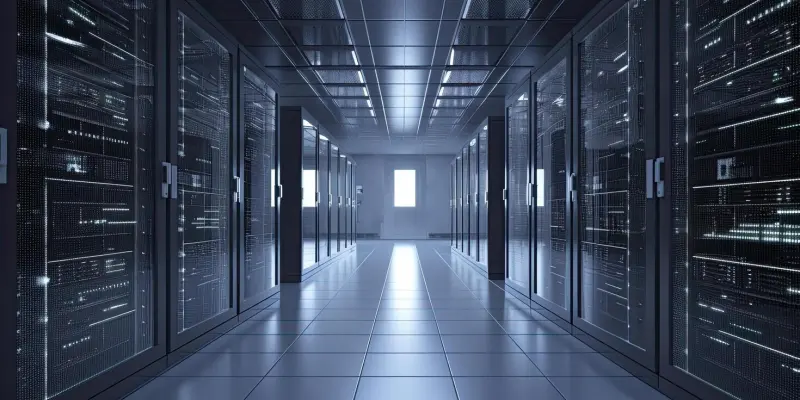As global data consumption continues to surge, particularly with the proliferation of artificial intelligence applications, the imperative for efficient and sustainable data storage solutions has become more pressing than ever. A recent study commissioned by Seagate highlights how the expansion of data centers to accommodate AI-driven business demands has accentuated challenges related to energy consumption, carbon footprint, and overall sustainability. The survey gathered insights from 330 data center professionals across diverse international markets, revealing critical trends and considerations in the ongoing quest for greener data infrastructure.
Energy Usage and Carbon Footprint in Data Centers
Energy usage and carbon footprint are critical concerns as data centers expand to meet growing AI demands. According to the study, 53.5% of business leaders now prioritize energy efficiency, reflecting an urgent need to curb energy consumption in data centers. Goldman Sachs Research anticipates a 165% increase in global power demand for data centers by 2030, underscoring the pressing need for energy-efficient storage solutions.
Most of the data center professionals surveyed expect significant increases in data storage needs, with 97% predicting that AI growth will further exacerbate these demands. While 95% expressed environmental concerns, a mere 3.3% prioritize sustainability in purchasing decisions. This discrepancy highlights the significant barriers to adopting sustainable practices, including high energy consumption, raw material requirements, physical space constraints, infrastructure costs, and acquisition costs. Therefore, balancing the need for expanded data storage with sustainable practices requires innovative approaches and strategic planning.
Strategies for Reducing Energy Consumption and Extending Equipment Life Cycles
To address the dual challenge of managing data growth and achieving sustainability goals, the study suggests several strategies. One effective approach involves reducing the total cost of ownership through the efficient use of power when storing data. Another strategy focuses on implementing storage tiering, which ensures that data is stored in the most appropriate storage medium based on its usage frequency. Extending the life cycle of storage devices and optimizing space utilization within data centers also offer tangible benefits. Reducing the embedded carbon contributions from manufacturing, shipping, and assembling storage systems is essential. It is imperative to select storage solutions that minimize the need for continuous power generation to sustain operations. Comparative estimates show that SSDs generate nearly 200 times more embodied carbon per terabyte per year than HDDs due to the energy-intensive semiconductor manufacturing processes involved. While LTO tapes produce less carbon than SSDs, they generate slightly more carbon than HDDs. Nevertheless, their unique operational roles must be factored into overall assessments.
Addressing Barriers to Sustainability
Despite increasing awareness of environmental concerns, practical implementation of sustainable practices in data storage remains challenging. While 92.2% of respondents recognized the importance of extending storage equipment life cycles, only 15.5% considered it a crucial purchasing factor. High initial costs, complex installation processes, and the need for substantial physical space often deter businesses from prioritizing sustainability.
However, overcoming these barriers is essential for achieving long-term sustainability goals. Companies must invest in research and development to innovate more energy-efficient storage technologies and streamline processes to reduce acquisition and operational costs. Encouraging policy measures and incentives from governments and regulatory bodies can also drive broader adoption of sustainable practices in the data storage sector. Collaborative efforts among industry stakeholders, including technology providers, data center operators, and policymakers, are necessary to create a conducive environment for sustainable advancements.
Optimizing Power Consumption and Storage Efficiency
Operational power consumption is another critical factor in sustainable data storage. SSDs are found to use over 50% more power per terabyte compared to HDDs. While LTO tapes seem to consume more power during active writing and reading phases, they remain predominantly idle in library systems, resulting in better average power efficiency. This understanding necessitates careful planning in hierarchical storage systems within data centers to ensure that different storage mediums are used optimally based on their respective power consumption profiles. Incorporating renewable energy sources and energy-efficient technologies in data center operations can significantly reduce overall power consumption and carbon emissions. By leveraging advancements in artificial intelligence and machine learning, predictive analytics can optimize storage resource allocation, reducing energy waste and enhancing efficiency. Additionally, implementing dynamic cooling systems that adjust based on real-time thermal conditions can further minimize energy usage and contribute to sustainable operations.
Future Considerations for Greener Data Centers
As global data consumption continues to soar, the rising use of artificial intelligence (AI) applications has further underscored the need for efficient and sustainable data storage solutions. This urgency is highlighted in a recent study commissioned by Seagate, which sheds light on the expanding data centers built to meet AI-driven business needs. The rapid growth of these facilities has brought significant challenges related to energy consumption, carbon impact, and overall sustainability to the forefront. The study, which surveyed 330 data center professionals from various international markets, unveils key insights and trends in the ongoing effort to develop greener data infrastructure. These professionals shared their experiences and concerns, emphasizing how the increased demand for AI and data services intensifies the need for environmentally sound solutions. Overall, the findings suggest that addressing these sustainability challenges is crucial to creating a more sustainable and energy-efficient future for data storage and processing amidst the relentless growth of global data consumption.

